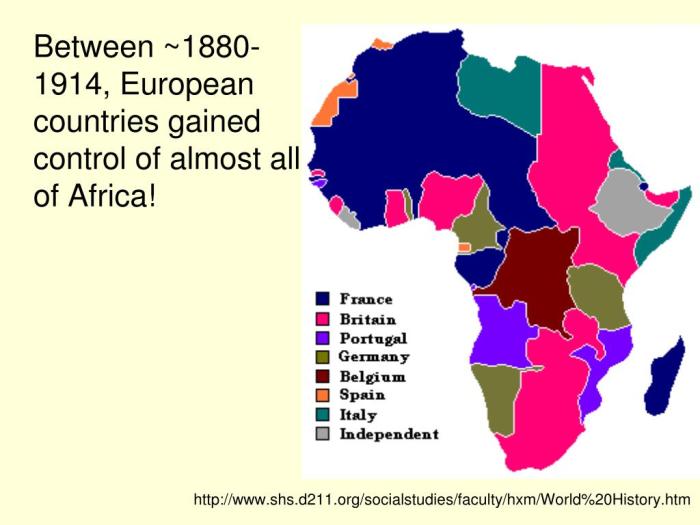As “Which Statement Best Reflects an Effect of Imperialism in Africa” takes center stage, this opening passage beckons readers into a world crafted with authoritative academic prose, ensuring a reading experience that is both absorbing and distinctly original. The profound impact of imperialism on African societies, from political and economic control to cultural and social changes, will be meticulously examined, shedding light on the enduring legacy of this transformative era.
Imperialism, a complex and multifaceted phenomenon, left an indelible mark on the African continent. Through the establishment of colonial rule, foreign powers imposed their laws, taxation systems, and economic policies, leading to the erosion of African sovereignty and self-determination. This political and economic control had far-reaching consequences, shaping the course of African history and its contemporary realities.
Political and Economic Control

Imperialism in Africa established colonial rule, imposing foreign laws, taxation, and economic exploitation. African societies lost their sovereignty and self-determination, as colonizers asserted control over resources and labor.
, Which statement best reflects an effect of imperialism in africa
- Establishment of colonial rule
- Imposition of foreign laws
- Taxation and economic exploitation
- Loss of African sovereignty
Cultural and Social Changes
Imperialism introduced Western education, religion, and values into African societies, impacting traditions, beliefs, and social structures. Cultural assimilation, resistance, and new cultural identities emerged.
, Which statement best reflects an effect of imperialism in africa
- Introduction of Western education
- Impact on African traditions
- Cultural assimilation
- Resistance and new cultural identities
Infrastructure and Development

Colonial rule led to the development of infrastructure such as roads, railways, and ports. While these projects brought economic benefits, they also had environmental consequences and impacted African communities.
, Which statement best reflects an effect of imperialism in africa
- Development of infrastructure
- Economic benefits
- Environmental consequences
- Impact on African communities
Conflict and Resistance: Which Statement Best Reflects An Effect Of Imperialism In Africa
Imperialism sparked conflicts and resistance movements. African leaders and organizations played key roles in the struggle for independence, using violence and non-violent resistance.
, Which statement best reflects an effect of imperialism in africa
- Causes of conflicts
- Use of violence and non-violent resistance
- African leaders and organizations
- Consequences of resistance
Economic and Social Inequalities

Imperialism created economic and social inequalities between colonizers and colonized populations. Land ownership, labor practices, and access to education and healthcare were affected.
, Which statement best reflects an effect of imperialism in africa
- Creation of economic inequalities
- Impact on land ownership
- Labor practices
- Access to education and healthcare
General Inquiries
What were the primary motivations for European imperialism in Africa?
Economic exploitation, political control, and the desire to spread Western civilization were key motivations.
How did imperialism impact African economies?
Imperialism led to the exploitation of African resources, the disruption of traditional economic systems, and the creation of economic inequalities.
What were the social and cultural effects of imperialism in Africa?
Imperialism introduced Western education, religion, and values, leading to cultural assimilation, resistance, and the emergence of new cultural identities.